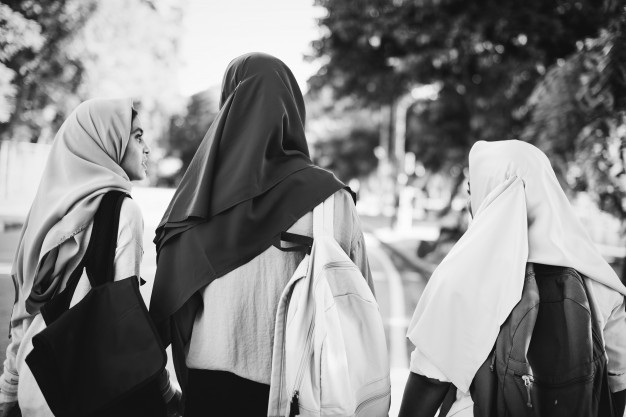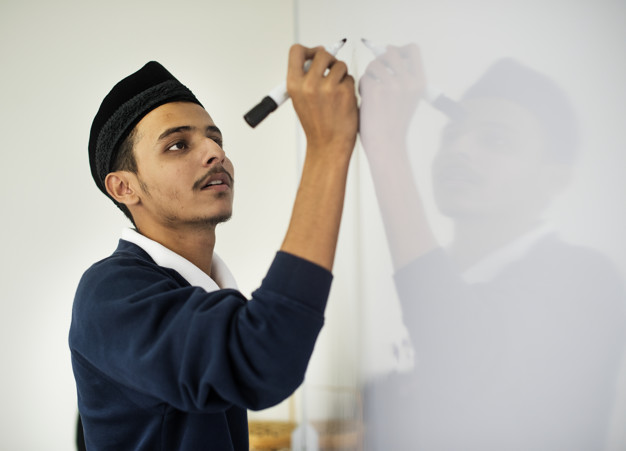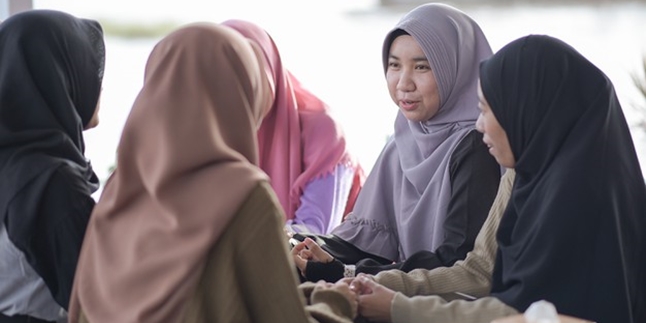Kapanlagi.com - Santri is a term for someone who undergoes Islamic religious education at Islamic boarding schools. Yes, Islamic boarding schools are Islamic educational dormitories established for children who will study and seek in-depth knowledge of Islam. From moral education to book education and many more. For students, advice is a good and valuable gift given by teachers. There are many pieces of advice and words for students.
These words for students become wise advice for them in living their lives, both while at the boarding school and after finishing. All of these wise advice can also become a life guide so as not to make mistakes in making decisions or in life's path. Because if we make a mistake, then as humans we can get lost in this cruel world.
Here are 29 words for students from scholars and teachers as wise advice and life guides. Let's check it out, KLovers.
1. Words for Students from Ustaz Abdul Somad

Illustration (credit: Freepik)
The first words are for students, namely words for Ustaz Abdul Somad. And here are 10 words for those students:
1. "Stay feeling like a student, so you don't stop serving."
2. "Stay feeling like a student, so you don't become arrogant."
3. "Stay feeling like a student, so you have good manners."
4. "Stay feeling like a student, so you don't feel right on your own."
5. "Stay feeling like a student, so you still feel the need to read the holy book."
6. "Stay feeling like a student, so you still respect the kyai."
7. "Stay feeling like a student, so you have the spirit to build the nation."
8. "Stay feeling like a student, so you care about the economy."
9. "Stay feeling like a student, so you are not afraid of death."
10 "Stay feeling like a student, so you fear the Divine. Happy Student's Day, do something beneficial for the motherland."
2. Words for Students from KH Hasyim Asy'ari

Illustration (credit: Freepik)
Next, there are words for students from KH Hasyim As-Syafi. He is a famous Muslim figure in Indonesia. KH Hasyim As-Syafi is one of the Indonesian National Heroes who founded Nahdlatul Ulama, the largest Islamic mass organization in Indonesia. Here are some advice and words for students from KH Hasyim As-Syafi:
11. A student should cleanse their heart from anything that can defile it, such as grudges, envy, false beliefs, and bad behavior. This is intended to make the heart receptive to acquiring knowledge, memorizing it, understanding complex issues, and comprehending them.
12. One should have good intentions in seeking knowledge, namely seeking the pleasure of Allah, practicing the knowledge, living by Islamic teachings, enlightening and beautifying the heart, and drawing closer to Allah. Do not have intentions solely for worldly gains such as seeking leadership, rank, and wealth, or to show off in front of others or to gain their respect.
13. One should immediately use their youth and age to acquire knowledge, without being deceived by the temptation of "procrastination" and "long daydreaming", because every second that is wasted from one's age cannot be replaced. A student should try to cut off any busy affairs and obstacles that hinder the perfection of learning and the strength of determination and seriousness in producing knowledge, because all of these are factors that hinder the pursuit of knowledge.
14. Accepting clothing and food as they are because patience in the face of various shortcomings in life will bring about extensive knowledge, focus of the heart from various daydreams, and wisdom that emanates from its source. Imam As-Syafi'i Ra said, a person who seeks knowledge accompanied by arrogance and luxury will not be happy. But the one who is happy is the person who seeks knowledge with humility, hardship in life, and service to scholars.
15. Skilled in dividing time and utilizing the most valuable remaining years of life. The best time for memorization is during suhoor, for deepening understanding in the early morning, for writing during midday, and for studying and reviewing lessons at night. Meanwhile, the best place to memorize is in a room and places far from disturbance. It is not good to memorize in front of plants, rivers, and crowded places.
16. Eat and drink a little. Being full will only prevent worship and make the body heavy for studying. Among the benefits of eating a little is a healthy body and being protected from diseases caused by excessive eating and drinking, as expressed in a poem meaning: 'Indeed, the diseases you know the most come from food or drink.' The heart is said to be healthy when it is free from excess and arrogance. And none of the chosen guardians, imams, and scholars have the characteristic or are praised for their excessive eating. The one praised for excessive eating is an animal that does not have intelligence and is only prepared for work.
17. Adopting wara' (avoiding doubtful matters whose halal or haram status is unclear) and being cautious in all matters. Choosing halal goods such as food, drinks, clothing, housing, and all the necessities of life so that the heart is illuminated and easily accepts the light of knowledge and its benefits. A student should use the laws of leniency (rukhsah) in their proper place, namely when there is a need and a reason that allows it. Indeed, Allah is pleased when leniency is practiced, just as Allah is pleased when His 'azimah (pre-existing law before leniency) is performed.
18. Minimize the consumption of foods that cause dullness of the brain and weakness of the senses, such as sour apples, green beans, and vinegar. The same goes for foods that increase phlegm, which slows down brain function and weighs down the body, such as excessive milk and fish. A student should stay away from things that cause forgetfulness, such as eating leftover food from mice, reading inscriptions on gravestones, passing between two camels walking side by side, and throwing away live lice.
19. Minimizing sleep as long as it does not have a harmful effect on the body and brain intelligence. Not adding more than eight hours of sleep in a day. It can be less than that, as long as the body is strong enough. It is not a problem to rest the body, heart, mind, and eyes when feeling tired and weak by going to recreational places so that one's condition can be refreshed.
20. Leaving socializing because it is the most important thing that should be done by seekers of knowledge, especially socializing with the opposite sex and when socializing is more about playing around and not maturing the mind. Human nature is like a skilled thief (imitating other people's behavior quickly) and the effect of socializing is a waste of life without purpose and losing religion when socializing with non-religious people. If a student needs someone to accompany them, they should be a good friend, strong in their religion, pious, cautious, with a pure heart, with many good deeds, with good self-esteem (muru'ah), and not involved in many disputes: if the friend forgets, remind them and if they realize, help them.
3. Words for Students from Kiai Tolchah

Illustration (credit: Freepik)
And the last one is words for students from KH Kiai Tolchah. KH Tolchah Hasan is a figure who has been involved in many aspects for the Indonesian society. However, it seems that his role in the field of education (tarbiyah) is the most prominent. His spirit as an educator is clearly seen from his dedication from pesantren (Islamic boarding school) to university. And here are some advice and words for students from KH Tolchah Hasan:
21. Whoever learns the Quran from childhood, the Quran will flow mixed in their blood and flesh.
22. The virtue of students who go to study thalabul ilmi (seeking knowledge): they are prayed for by the angels, prayed for by the fish, prayed for by the animals.
23. The recipe for fast learning and benefits: ta'allum (continuous learning), learning from a teacher, seeking closeness to Allah, spiritual exercises, and avoiding sinful actions.
24. If there are cases where people have the same school, the same pesantren, the same teacher, the same food, but the results are different, perhaps sinful actions are the differentiating factor.
25. Three things that students or learners should avoid in order to easily receive lessons. The first is fudlul tha'am (eating too much), the second is fudlul manam (sleeping too much), the third is fudlul kalam (talking too much and babbling).
26. Students should divide the night into 3 parts. The first part for studying, the second part for worship, and the third part for rest.
27. In order for knowledge to be beneficial and blessed, one should always be obedient to Allah, obedient and respectful to teachers, and obedient and respectful to parents.
28. For parents of students, so that our sons and daughters can maintain their knowledge, every night parents must pray for them. Among the prayers are:
"Rabbana hab lana min azwajina wa dzurriyyatina qurrata a'yun wa ij'alna lilmuttaqina imaman."
Meaning: Our Lord, grant us from among our wives and offspring comfort to our eyes and make us an example for the righteous)-read seven times. This is so that our efforts in providing for them will not be in vain.
29. Then always pray: "Allahumma barik lana fi 'umrina, allahumma barik lana fi ahlina, allahumma barik lana fi 'ilmina, allahumma barik lana fi 'amalina, allahumma barik lana fi rizqina, allahumma barik lana fi kulli ma a'thaitana."
Meaning: O Allah, bless us in our age. O Allah, bless us in our family. O Allah, bless us in our knowledge. O Allah, bless us in our actions. O Allah, bless us in our sustenance. O Allah, bless us in everything that You give us.
These are 29 words for students from teachers, scholars, or religious teachers that can be used as advice and guidance in living a good life while undergoing education in a boarding school.
(kpl/dhm)
Disclaimer: This translation from Bahasa Indonesia to English has been generated by Artificial Intelligence.















